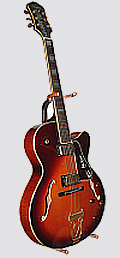Epiphone Electric Guitars...
Triumph, Tragedy and And A Change Of Hands
Epiphone Electric Guitars Arrive...
Epiphone electric guitars were on the horizon in the mid-1930's.
By this point Epiphones were considered among the best guitars in the world and Epi was enjoying
the patronage of some of the greatest players of the time.
This resulted in the design of the Electar series(originally called the Electraphone) and the first Epiphone electric guitars were born. The design of the Electar series guitars was strong and the line was very successful. The Electar not only delivered a devastating blow to Epiphone's rivals but also secured their reputation as innovators. As a result, Epiphone's sales had doubled by the summer of 1937.
Tragedy Strikes...

Epiphone continued butting heads with Gibson introducing cut-away versions of the Emporer and DeLuxe and raised the bar considerably with an electric version of the DeLuxe. From the outside, it appeared the Epiphone was still riding high.
On the inside, however, things were much different. The Stathopoulos brothers were not getting along and it took its toll on the business. As a result, quality began to decline and Epiphone began to lose the reputation for craftmanship and innovation that Epi had built. In 1948, Frixo sold his share of the business to Orphie.
To compound the problems, unionization issues led Orphie to move the factory to Philadelphia in 1953 to sidestep the unionization. Unfortunately, many of Epiphone's top craftsmen refused to make the move. Quality dropped and affected the business adversely enough that bankruptcy became a very real possibility.
Epiphone Changes Hands...
Epiphone's problems worsened as the 1950's progressed but Gibson's star was rising. With the decline of Epiphone Gibson's main competitor was now Fender, the creator of the iconic Stratocaster and Telecaster. Gibson's only weakness was in the lack of their upright bass production which had ceased during the war and never resumed.
This was rectified when Gibson's general manager, Ted McCarty, was approached by Orphie about buying out Epiphone's bass line which was still highly respected despite Epiphone's troubles. Orphie's asking price was $20,000. McCarty didn't think twice about it and Epiphone became the property of Gibson in May of 1957.
Gibson's original intention was to harness the reputation of Epiphone's bass line, but McCarty decided to revive Epiphone and produce a new line of instruments. At the time, dealers competed fiercely for the right to carry the Gibson line and only the largest and most established were granted a contract to carry Gibsons. McCarty's idea provided the perfect solution. The new Gibson-made Epiphones would be offered to dealers who were still "earning their stripes" which would give them Gibson quality products without stepping on the toes of the established dealers.
Like the Phoenix, however, Epiphone was not to remain in the ashes for long. The entire Epiphone line was about to undergo a revival, including the Epiphone electric guitars.
30 Day FREE TRIAL!








New! Comments
Have your say about what you just read! Leave me a comment in the box below.